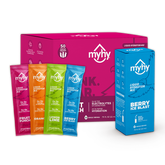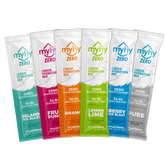Heat stress and dehydration on their own are uncomfortable at best and at worst, dangerous. Mix them together and you’ve got a recipe for disaster. But what do you do when your livelihood depends on your ability to perform at the highest level in excessively hot environments? As temperatures continue to rise, it’s more important than ever to stay properly hydrated, not just for your job’s sake, but for your own health and wellness.
Understanding Heat Stress
Heat stress occurs when the body cannot dissipate heat efficiently, leading to a rise in core temperature. This condition can result from a combination of high temperatures, humidity, physical exertion and insufficient fluid intake. When the body's natural cooling mechanisms, such as sweating and increased blood flow to the skin, are overwhelmed, heat stress can set in.
Symptoms and Risks of Heat Stress
The symptoms of heat stress range from mild to severe and can escalate rapidly. Initial signs include excessive sweating, thirst and fatigue. If untreated, these can progress to more serious conditions like heat exhaustion and heat stroke.
Heat exhaustion is characterized by heavy sweating, weakness, dizziness, nausea and headache. Heat stroke, which is a life-threatening emergency, manifests as a high body temperature (above 104°F), confusion, rapid pulse and loss of consciousness. Long-term risks of repeated heat stress include chronic kidney disease and cardiovascular problems.
Vulnerable Populations
While anyone can suffer from heat stress, certain groups are particularly at risk. People who work or perform activities outdoors in high temperatures are especially vulnerable. They often face prolonged exposure to heat and engage in strenuous physical activities that increase the risk of dehydration and heat stress.
The Role of Hydration in Combating Heat Stress
Importance of Hydration
Staying hydrated is essential for maintaining the body's ability to regulate temperature and perform optimally. Water is crucial for various bodily functions, including digestion, nutrient transport and temperature regulation. When the body is adequately hydrated, it can sweat effectively, cooling the body through evaporation. Without sufficient fluids, these processes are impaired, increasing the risk of heat related illnesses.
Electrolyte Balance
While water is essential, electrolytes—minerals like sodium, potassium and magnesium—are equally important in maintaining hydration and preventing heat stress. Electrolytes help regulate nerve and muscle function, hydrate the body and even balance blood pH levels. When you sweat, you lose both water and electrolytes.
Replenishing these lost electrolytes is crucial to maintaining fluid balance and preventing muscle cramps, fatigue and other, more severe, symptoms of heat stress. MyHy is specifically formulated to address these needs, providing a balanced mix of essential electrolytes for optimal hydration after excessive sweat loss.
Signs of Dehydration
Recognizing the early signs of dehydration can help prevent heat stress. Common symptoms include dry mouth, thirst, dark yellow urine, fatigue and dizziness. Severe dehydration can lead to confusion, rapid heartbeat and even unconsciousness. Monitoring these signs and taking proactive steps to stay hydrated can make a significant difference in high-temperature environments.
Effective Hydration Strategies
Daily Hydration Needs
General guidelines for daily fluid intake vary based on factors like age, sex, weight and activity level. For most adults, a daily intake of about 3.7 liters (around 15.5 cups) for men and 2.7 liters (11.5 cups) for women is recommended. That includes total fluid consumption including water from foods and other beverages throughout the day. However, those in high-temperature environments or engaging in strenuous physical activity will need more.
Timing and Quantity
Timing and quantity of fluid intake are critical. Drinking small amounts of water regularly throughout the day is more effective than consuming large quantities infrequently. Before engaging in physical activity, individuals should pre-hydrate by drinking 16-20 ounces of water 2-3 hours before starting. During activity, aim to consume 6-12 ounces of fluid every 15-20 minutes. Post-activity, rehydrate by drinking 8 ounces of fluid. MyHy electrolyte drinks are convenient for maintaining hydration throughout the day and during intense activities.
Choosing the Right Hydration Mix
Selecting the right hydration mix involves looking for products that provide a balanced combination of water, electrolytes and carbohydrates. Key electrolytes include sodium, potassium and magnesium, which help replenish those lost through sweat. Additionally, the hydration mix should be palatable to encourage regular consumption. MyHy is specially formulated to meet these criteria, ensuring effective and enjoyable hydration.
Benefits of Liquid Hydration Mixes
Why Liquid Formulas?
Liquid electrolyte mixes offer several advantages over powders or tablets. They are often more convenient, requiring no mixing or preparation, and can be consumed quickly. Liquid formulas also tend to be absorbed more rapidly, providing faster hydration and electrolyte replenishment. This is particularly important in situations where immediate hydration is crucial. MyHy, being in liquid form, offers these benefits, making them an excellent choice for those in high-temperature environments.
Performance Enhancement
Proper hydration can significantly enhance cognitive and physical performance. Staying hydrated means sharper focus, better decision-making, improved endurance, strength and recovery. Those working outdoors can maintain higher productivity levels and reduce the risk of heat-related accidents.
Recovery Aid
Hydration plays a vital role in recovery after intense physical activity. Replenishing fluids and electrolytes lost through sweat helps restore balance and prevent muscle cramps and fatigue. This is particularly important for those who need to be ready for their next task or shift.
Hydration is not just a matter of comfort—it's a critical component of health and performance for those in high-temperature, high-stress environments. People who work or perform activities outdoors face unique challenges that make proper hydration essential. By understanding the risks of heat stress, recognizing the signs of dehydration and implementing effective hydration strategies, you can protect your health and enhance your performance.







